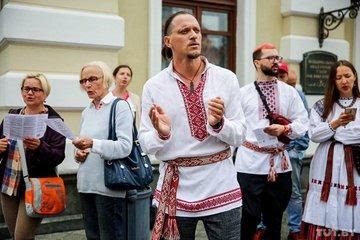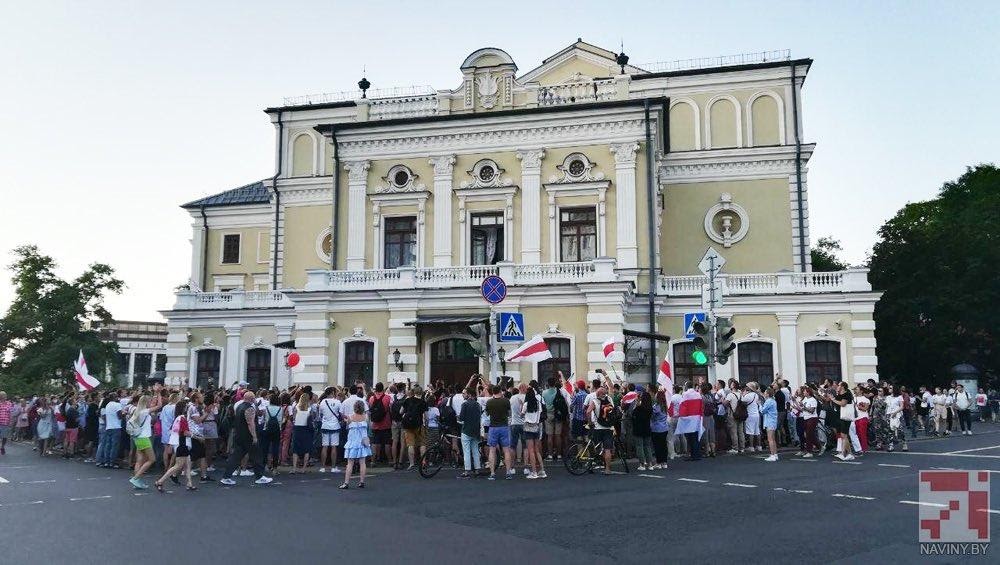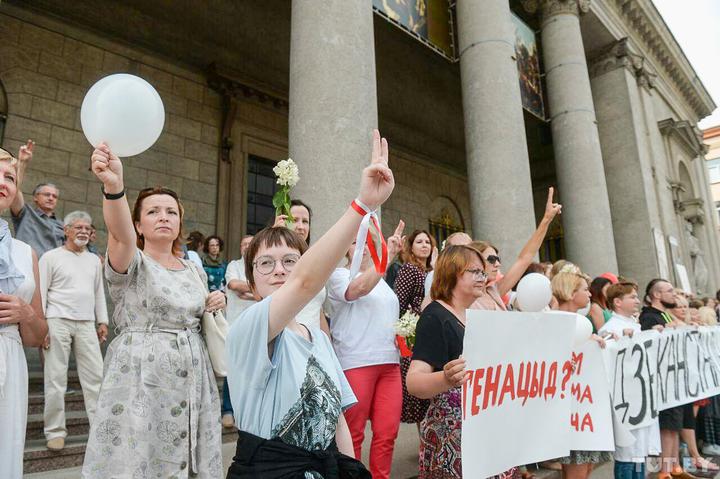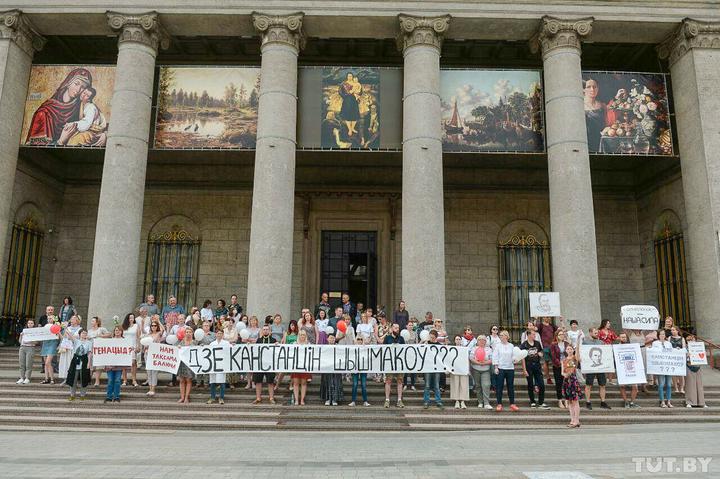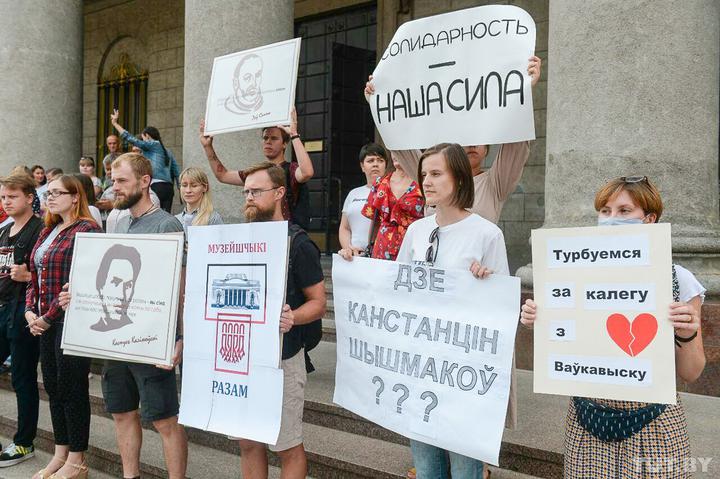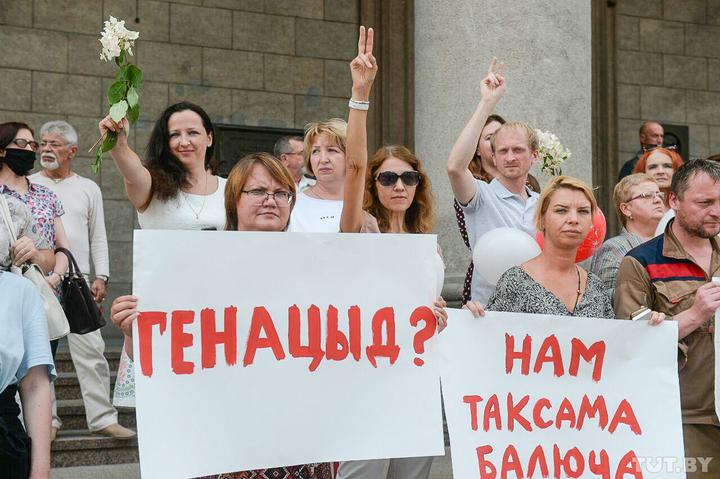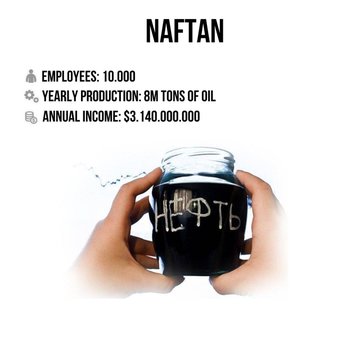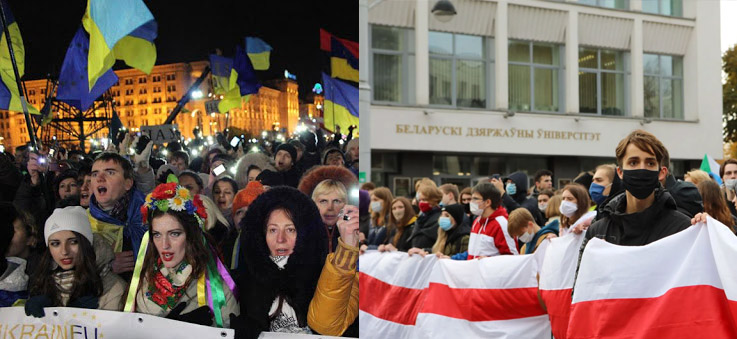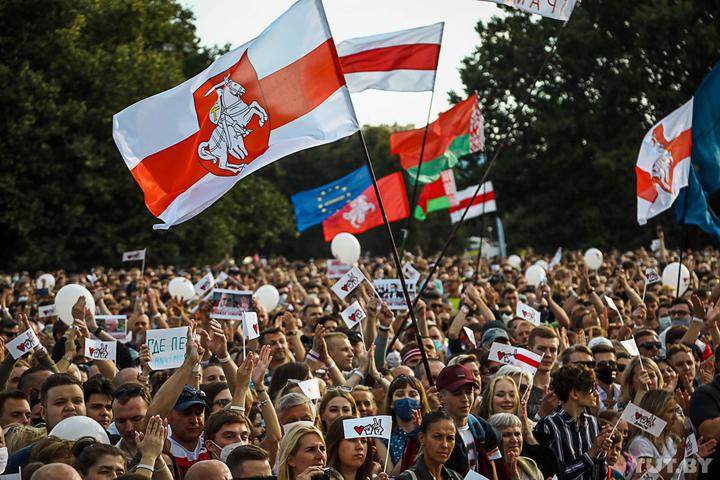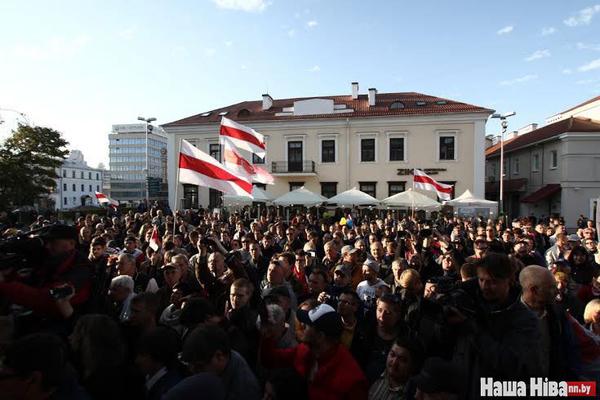The official Coordination Council is underpinned by hundreds of small rallies, strikes and individual statements from people representing various professions. Their support is exceptionally diverse; including state enterprises, TV channels, governmental bodies, municipal councils and other public officials. Widespread support is the main prerequisite for the success of what might be termed a Belarusian revolution. Here are a few broad brushstrokes of this wide landscape.
First municipality challenges Lukashenka
Opposition leader Sviatlana Tsikhanouskaya called on protesters to demand local authorities to support protests through public statements. Such a coordinated action could launch a devastating blow to Lukashenka’s regime. If the majority of local councils upheld the protesters, Lukashenka’s administrative support would be greatly undermined. On 19 August, protests were crowned by a first such success. After a mass rally in Grodno the previous evening, the city administration released a statement where it fulfilled protesters’ demands.
Mass demonstration in Grodno city center on 18 August evening:
Video of tonight’s large peaceful #protest rally in central #Hrodna, west #Belarus. Protesters are chanting “Long live Belarus!”:
— Alex Kokcharov (@AlexKokcharov) August 18, 2020
Specifically, the Grodno municipality created the Council of Public Accord with representatives both from local authorities and civil society. The city was to allow events in the central squares. And as long as notification of public events was received in advance, medical, technical and communication support would be provided. Protesters would be allowed airtime on Grodno local TV. Most importantly, fulfilling two key demands, the Department of Internal Affairs of the Grodno Regional Executive Committee issued a public apology, and citizens detained for participating in so-called “unauthorized mass events” were released.
Musicians, museum workers, and sportsmen
As often happens, preceding even the early gatherings of protestors are actions by other sectors of society which can go unnoticed. Prior to the mass demonstrations that were broadcast around the world, artists, writers, and musicians, and other cultural and intellectual elites, were already in motion. Theaters, museums, sports teams, and many other non-political communities were organizing their own small rallies. An interesting feature of the Belarusian uprising has been that many unique sectors of society held their own rally, in addition to participating in the larger rallies. Important to note is that the majority of cultural institutions in Belarus are state-owned, making any form of protest almost certain to result in job loss -- at the very least -- and certainly high-risk.
One of these early protests saw exactly that consequence. The troupe of the Minsk’s oldest and grandest Kupalauski theater took part in anti-government rallies. As a reprisal, theater director Paval Latushka was fired. The entire troupe then resigned in solidarity and carried out a vigorous outburst near the theater. They attracted hundreds of supporters who joined them.
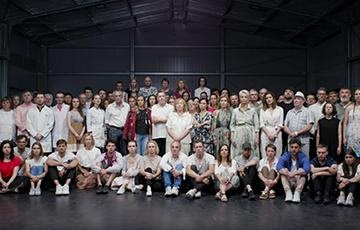
Latushka has directed what is the nation’s most prominent theatre since 2019. Earlier he served in Lukashenka’s government as ambassador to Poland, France and Spain, and as communications director for the Ministry of Foreign Affairs. His protest amounted not only to that of a cultural manager but also to that of a politician.
“In the life of every person there comes a line that cannot be crossed, says Latushka. That moment came for me when I saw people coming out of prisons, talking about the violence against them. I became ashamed. I considered it my moral duty to express my position.”
The Kupalauski troupe released a video, demanding fair elections and calling for police to serve the people rather than a dictator.
Other protests by members of the arts included the Musicians of the Belarusian State Philharmonic and Ryhor Shirma State Choir. Some 200 musicians gathered in the square in front of the Belarusian State Philharmonic to support the protesters. The assembly turned into a full-fledged concert.
[youtube https://www.youtube.com/watch?v=FBFyWosE_og&w=560&h=315]

The staff of Belarusian museums also came together in protest, and to commemorate a tragic loss. During demonstrations on 15 August, Konstantin Shishmakov, director of the Military History Museum in Volkovysk disappeared. Later, his family learned that he refused to sign the falsified protocol of the election commission. He called his wife in late afternoon and said: "I will not work here anymore, I am going home." But he never came home. On 18 August, he was found dead. While police claim he committed suicide, museum colleagues believe this to be a lie.
Employees of the National Art Museum of Belarus and the National Historical Museum also gathered to express solidarity – this time with all Belarusians who disappeared before and after the elections.
Belarusian sports heroes did not stand aside during these events. They have pledged to refuse representation of Belarus, if Lukashenka’s government continues its repression of citizens. More than 200 sports celebrities, including Olympic medal winners and world or European champions signed an open letter demanding the authorities to recognize the 9 August elections as invalid and to release all detained protesters as well as all Belarusian political prisoners. One of the nation’s champion handball players Artem Korolek commented about the events:
“I didn’t expect that it would happen that way, because everyone associates Belarus with calmness and order. Moreover, it all began peacefully … For me, this is horror. I could not believe what was happening, such cruel indifference to people who had not smashed a single storefront, nothing was on fire, everything went quietly. And yet more, already before the elections, I was shocked how in daylight some strange car arrives, and some strange athletic guys without uniform start taking people away. I thought we were living in 2020, not the 90s.”

State media
During the height of the protests, on 14 August, journalists of the state media presented an appeal to the Minister of Information.
“The fact that many of our colleagues in the state media are resigning is not fake, not political technology, not a paid PR campaign. This is a call of conscience and the impossibility to calmly look at the ongoing violence. Choosing our profession, and not a place of work, we thought that we should be objective conductors of sometimes polar opinions,” the appeal says.
However, the appeal had little impact on the official media policy. For example, state channel STV broadcast a crude anti-Tsikhanouskaya propaganda clip with her image imposed on scenes of war and destruction.
A number of employees of state-run Belteleradio company announced a strike. At first, only 55 out of 1,500 employees participated in the demonstration. Later their numbers grew. As a consequence, a majority of the protesters were either dismissed or resigned themselves. On 20 August, former employees of Belteleradio, who quit, decided to launch an alternative TV-channel.
Lukashenka’s regime, however, does not consider strikes as enough of a threat to change media policy. Sources have reported that at least six fired technical workers were replaced by workers from Russia. Incentives included generous salaries of some US$2,500 (much more than that of fired employees) and other social benefits.
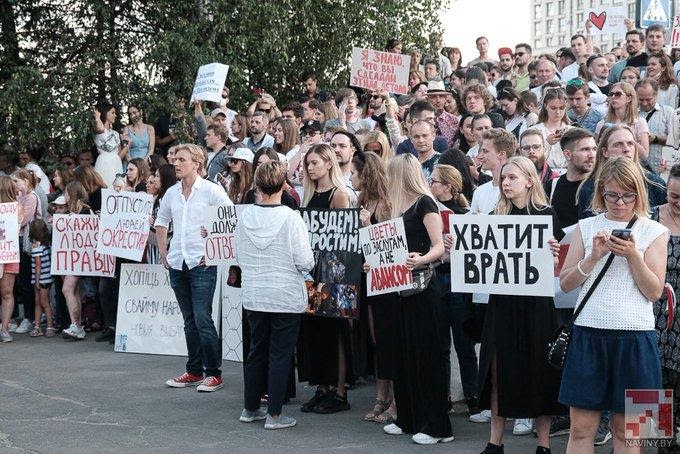
Along with Belteleradio employees, other state media also announced strikes or presented their demands to Lukashenka.
For example, the staff of the state newspaper Zvezda demanded to stop censorship and threatened to start a strike. They also demanded the publication of objective, truthful, and varied content in the newspaper; as well as an end to harassment, pressure, moral and physical violence against journalists performing their professional duties. However, the government’s answer showed that Lukashenka intends to fight to the very end. Zvezda’s editor-in-chief Pavel Sukhorukov was dismissed, and the Ministry of Information officials conducted telephone “conversations” with deputy editors-in-chief.
Belarusian doctors stay close to protesters
Belarusian doctors expressed their solidarity with protesters from the outset of demonstrations. They demanded a stop to repression and to allow doctors access to detained people who required help -- especially those who had been beaten or otherwise injured. Doctors sent an open appeal to the Minister of Health Vladimir Karanik. The appeal was signed by more than 300 medical workers:
We, like most of our colleagues, have to look with pain and disappointment at what is happening now in the healthcare system. Numerous patients come with bullet wounds of various localization, including penetrating wounds; including damage of internal organs; mine and explosive injuries, including those with brain damage, traumatic amputations of limbs, extensive defects. This is not a complete list of what doctors have to deal with at the moment.
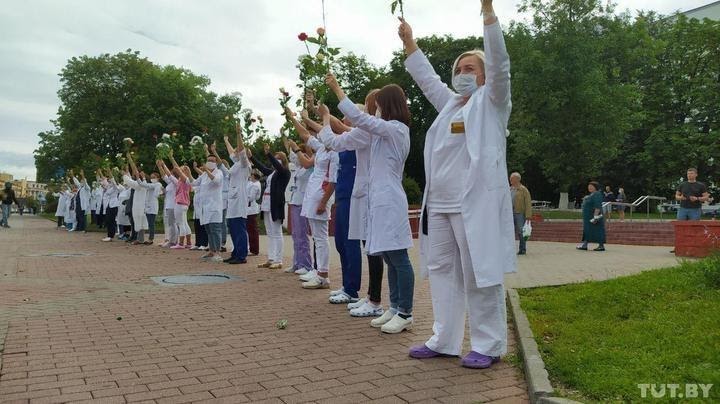
From the first day of protests, Belarusian doctors stayed close to protesters, offering medical and psychological help. Psychologists have been willing to work with Belarusians who suffered mentally during the protests. Dentists have offered to fix broken teeth. Traumatologists have worked around the clock to examine wounds and help with treatment. A list of volunteer doctors and private clinics was prepared and is regularly updated so that protesters can obtain any required help.
Workers of factories - the main force of the Belarusian protest
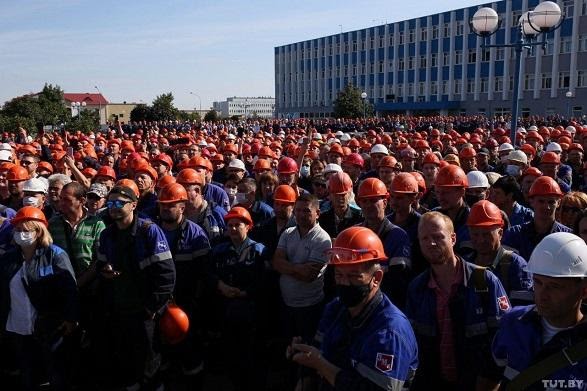
Industrial workers have been, without a doubt, the main drivers of the Belarusian protest. Their clout has been especially powerful when taking into account that the country’s industrialized economy would severely suffer under mass strikes. According to belzabastovka.org -- the online outlet providing updates on the Belarusian strike -- more than 100 state enterprises have announced strikes. And there are not “some 20 people,” as Lukashenka said, but thousands are refusing to work until their demands for free elections are fulfilled.
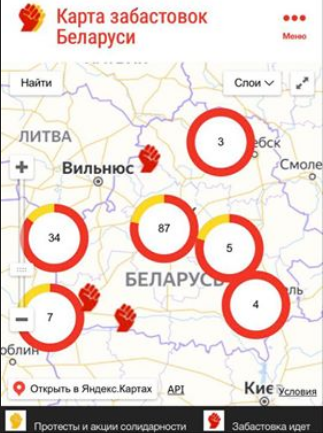
Reportedly, workers who supported the strike are being fired. MAZ is cancelling the contracts of those who joined the strike committee. Some workers are being intimidated and threatened with criminal persecution. Many workers do not believe they will compensated or in any way supported.
Nonetheless, to assist those who were unlawfully dismissed due to their political stance, Belarusians have created a Solidarity Fund. The fund has already collected €1 million from the donations of ordinary people. Everyone who is unlawfully dismissed can receive €1,500 -- equal to three average monthly salaries.
Another similar initiative run by a private foundation, the social program known as Kali Laska, is helping prepare the children of unlawfully dismissed workers for the upcoming school term, hiring school staff, purchasing textbooks, funding sports equipment, and so on.
Some staff members of Belarusian Government and Ambassadors also support protests
Igor Leshchenya, Belarusian ambassador to Slovakia, was among the first government officials to oppose Lukashenka. On 15 August he resigned and posted a stinging video supporting protestors.
“Hundreds of my compatriots felt that staff of law enforcement agencies have restored the traditions of the NKVD in full scale at the European-tolerant Belarus of the 21st century ... I express my solidarity with those who participated in peaceful rallies so that their voices can be heard,” said Leshchenya.
On 17 August, two senior officials of the Ministry of Foreign Affairs held a rally in front of the ministerial building. The head of the Historical and Archival Department, Viacheslav Kazachenok, and Deputy Head of the Eurasian Integration Department, Elena Kopaneva, were photographed holding blank sheets of paper to demonstrate they are ready to resign. At the same time, they acknowledged that they are all "statesmen,” emphasizing that Belarusian state is not exclusively Lukashenka’s.
“Stay with the people, please stop the genocide. Free people from prison, give them medical aid,” Kazachenok urged riot police. He also addressed the president directly: “Why not keep your word and leave with a suitcase under your arm? You were separated from the people long ago and hopelessly."
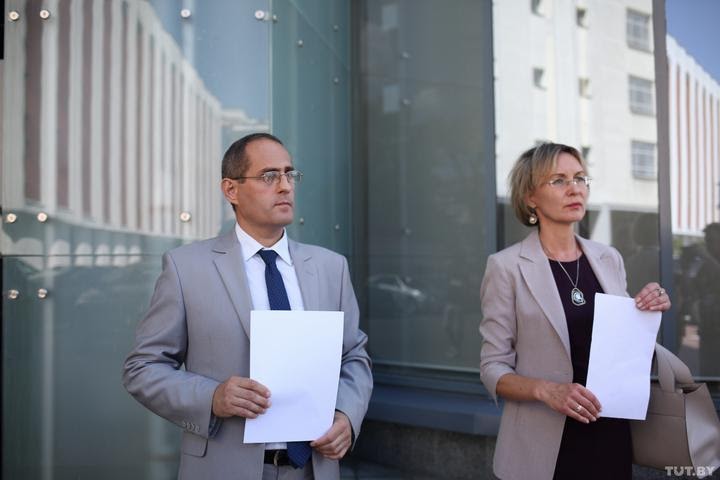
On 18 August, Belarusian Ambassador to Spain Pavel Pustovoi posted a statement on Facebook where he demanded a vote recount the vote and prosecution for those who beat protesters, as well as those who provoked violence.
Also on 18 August, in the United Arab Emirates (UAE), the Belarusian Consul General Igor Bondarev and the Consul Vitaly Kniazev supported a joint address of Belarusian diaspora representatives that was point-blank directed at Lukashenka in which they demanded a stop to violence against peaceful protesters.
Ministry of Internal Affairs says it's not a "regime" but part of society
The Ministry of Internal Affairs that controls the police and is the key ministry for Lukashenka’s hold onto his dictatorial regime also released a statement on 18 August. Although not a statement of support for protesters, surprisingly it also expresses loyalty, and encourages all concerned to seek understanding between protesters and police rather than to condemn demonstrations. The statement begins: “Sharing concern about the future of the country and people, without condemning the aspirations of compatriots for positive and peaceful changes,” and was published by the press secretary of the ministry. The ministry seems to recognize its responsibility and wrongdoing for excessive violence of some police units, but at the same time emphasizes that the majority of police officers serve only to protect people and are not offenders.
“A misleading attitude is being formed: to be a law enforcement officer is a shame and bad, reads the statement. All police officers are demonized without exception. [Some activists and politicians] expect from us a pathetic refusal from certificates, joining the columns of protesters …"
The statement continues:
"Most of the remaining police wear uniforms in order to serve society and the state. And people who call on ‘honest policemen’ to throw out this form do not give answers to simple and logical questions ... If all the police quit, who will defend Belarusians who remain at home while the other part of them expresses their opinion on the streets? ... We are not a ‘regime,’ we are a part of society! Right now, we are obliged to serve in our places as never before."
Along with some police officers, a number of soldiers of the Belarusian army joined protests, undermining Lukashenka’s military support. In particular, 30 paratroopers -- considered to be elite troops -- participated in city rallies, wearing their uniform t-shirts. Several protesters met them with applause.
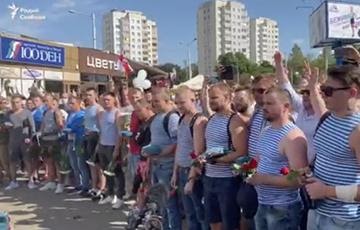
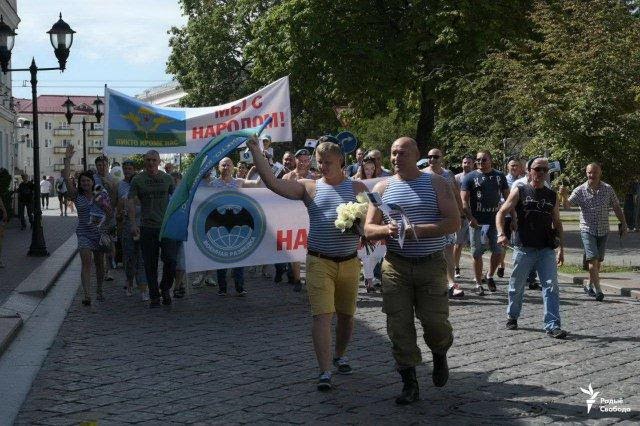
Despite the widespread support of protests, Lukashenka has no intention of resigning. He continues to organize rallies in his support, by mobilizing state workers, the army, and arms of the government. As far as the increasing support of protestors by NATO countries, Lukashenka claims they are interfering in Belarusian affairs and spurring revolution.

